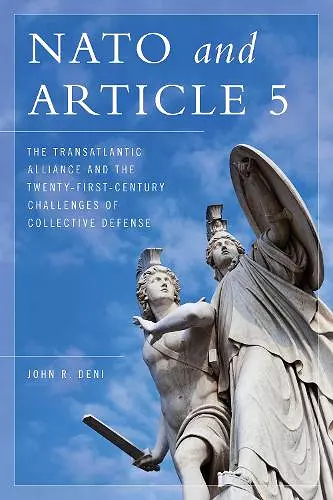NATO and Article 5
The Transatlantic Alliance and the Twenty-First-Century Challenges of Collective Defense
Format:Hardback
Publisher:Rowman & Littlefield
Published:4th Oct '17
Should be back in stock very soon
This hardback is available in another edition too:
- Paperback£43.00(9781538107034)

For much of the last 25 years, NATO has focused on crisis management in places such as Kosovo and Afghanistan, resulting in major changes to alliance strategy, resourcing, force structure, and training. Re-embracing collective defense —which lies at the heart of the Treaty of Washington’s Article 5 commitment— is no easy feat, and not something NATO can do through rhetoric and official pronouncements. Nonetheless, this shift is vitally necessary if the alliance is to remain the bulwark of Western defense and security. Russia’s illegal annexation of Crimea and its invasion of Ukraine have fundamentally upended the security environment in Europe, thrusting NATO into the spotlight as the primary collective defense tool most European states rely upon to ensure their security. Collective defense is one of the alliance’s three core missions, along with crisis management and cooperative security. It is defined in Article 5, the most well-known and arguably most important part of NATO’s founding treaty, which states: “The Parties agree that an armed attack against one or more of them in Europe or North America shall be considered an attack against them all.” Although all three missions are vital to the interests of NATO’s many member states, collective defense has become first among equals once again. However, three very significant hurdles stand in the way of the alliance and its member states as they attempt to re-embrace collective defense. These loosely correspond to an ends-waysmeans construct. First is the alliance's strategy toward Russia. Is Russia an adversary, a partner, neither, or both? How should strategy and policies change to place the alliance and its members on more solid ground when it comes to managing Russia? Second are the ongoing disputes over resourcing and burden-sharing. In recent years, it has become commonplace for American leaders to publicly berate European allies in an effort to garner more contributions to the common defense. How might the alliance better measure and more equitably share security burdens? Third is the alliance’s readiness to fulfill its objectives. Many allies have announced or are implementing increases in defense spending. However, governments of European NATO member states are strongly incentivized by domestic politics to favor acquisition of military hardware or spending on personnel salaries and benefits, usually at the expense of readiness. The...
In the wake of Russian aggression against Ukraine and the election of Donald Trump in the US, NATO faced a complex challenge: how would it defend NATO-member states bordering Russia and Ukraine, and how would it address Trump's ambiguous statements on the alliance. In this context, Deni (research professor, U.S. Army War College) makes a timely contribution to the political and analytical discourse revolving around the issues NATO faces. The book reviews NATO's evolution from an emphasis on collective defense during the Cold War, as defined in Article 5, to an emphasis on crisis management and cooperative security—including Kosovo and Afghanistan. The latter attempted to cultivate an inclusionary approach to Russia. After the Ukraine crises began, NATO returned to a focus on collective defense and addressed, again, the problems of deterring Russia. Deni's analysis not only of "NATO's Russian Problem" but also of member-state defense spending, burden sharing, and, most important, readiness to respond to challenges posed by Russia is insightful. His study concludes with a recommendation on NATO strategy emphasizing readiness. The book is well annotated and includes an extensive bibliography. It is recommended for students, researchers, and policy makers. Summing Up: Recommended. Upper-division undergraduates through professionals. * CHOICE *
In the somehow contentious debates between two perspectives on the Alliance’s future, Deni offers a useful and detailed overview of what the challenges would be for NATO in returning to collective defense and Article 5.... I recommend this book to not only researchers and students, but also decision-makers, who should strive to pose more questions and investigate viable responses to our current state of affairs. * The Strategy Bridge *
In NATO and Article 5, John Deni provides a vital overview of the nature of alliance commitments and evolving security challenges. His focus on NATO is built around key interviews with practitioners and Deni's background as one of America's finest scholars of NATO and the transatlantic security relationship makes this book an essential part of any study of one of the most important questions confronting both American foreign and defense policy, European security, and global security more generally. At a time when an American president has raised questions about the nature of such "security guarantees" and burden-sharing in meeting them, this book is an absolute must read for students, practitioners and scholars a like. John Deni offers essential reading in one of the finest books produced to date on the North Atlantic Treaty Organization. -- Sean Kay, Robson Professor of Politics and Government, Ohio Wesleyan University
At a moment when NATO faces so many challenges, John Deni has written a useful guide for the past, present and future of the world's most important military alliance. Anyone interested in the way ahead for Transatlantic security would benefit from reading this book. -- Derek Chollet
The absolute beating heart of the NATO Alliance is Article 5. Much discussed and frankly not well understood, it serves as the cornerstone upon which all else is built. This thoughtful, lucid volume provides both the history and background and the current interpretation necessary for security professionals and general readers alike. I wish I’d had it in hand when I served as Supreme Allied Commander! -- James Stavridis, US Navy (Ret); Supreme Allied Commander at NATO 2009-2013; Dean, The Fletcher School of Law and Diplomacy, Tufts University
- Winner of Madigan Award for Scholarship at the US Army War College 2018
ISBN: 9781538107027
Dimensions: 239mm x 158mm x 18mm
Weight: 413g
180 pages